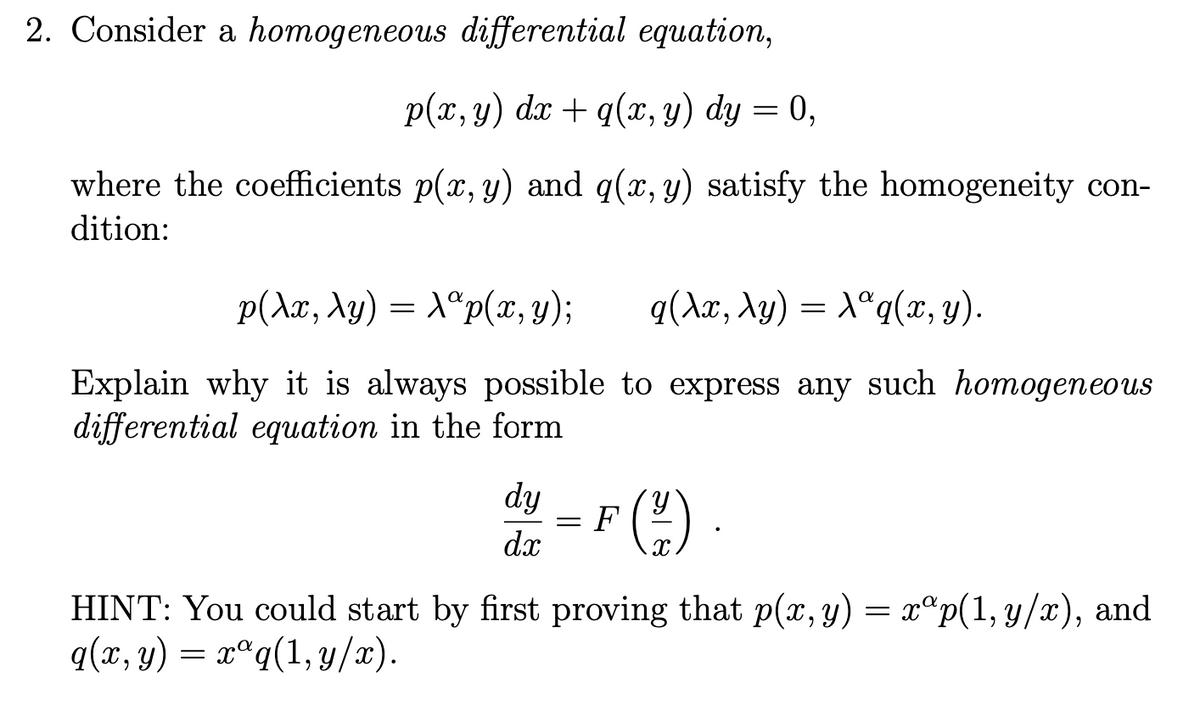2. Consider a homogeneous differential equation, p(т, у) dx + q(z, у) dy %3D 0, where the coefficients p(x, y) and q(x, y) satisfy the homogeneity con- dition: p(Аг, Ау) — А"р(a, у); q(λ, λ) - λq(α, 9). Explain why it is always possible to express any such homogeneous differential equation in the form dy = F dx () HINT: You could start by first proving that p(x, y) = x°p(1,y/x), and q(x, y) = x°q(1,y/x).
2. Consider a homogeneous differential equation, p(т, у) dx + q(z, у) dy %3D 0, where the coefficients p(x, y) and q(x, y) satisfy the homogeneity con- dition: p(Аг, Ау) — А"р(a, у); q(λ, λ) - λq(α, 9). Explain why it is always possible to express any such homogeneous differential equation in the form dy = F dx () HINT: You could start by first proving that p(x, y) = x°p(1,y/x), and q(x, y) = x°q(1,y/x).
Calculus: Early Transcendentals
8th Edition
ISBN:9781285741550
Author:James Stewart
Publisher:James Stewart
Chapter1: Functions And Models
Section: Chapter Questions
Problem 1RCC: (a) What is a function? What are its domain and range? (b) What is the graph of a function? (c) How...
Related questions
Question

Transcribed Image Text:2. Consider a homogeneous differential equation,
p(х, у) da + q(т, у) dy %3D 0,
where the coefficients p(x, y) and g(x, y) satisfy the homogeneity con-
dition:
p(Ax, \y) = X®p(x, Y);
α(λ, λ9) -λάq(π, y).
Explain why it is always possible to express any such homogeneous
differential equation in the form
dy
= F
dx
HINT: You could start by first proving that p(x, y) = x°p(1, y/x), and
q(x, y) = xªq(1,y/x).
Expert Solution
This question has been solved!
Explore an expertly crafted, step-by-step solution for a thorough understanding of key concepts.
Step by step
Solved in 2 steps with 2 images

Recommended textbooks for you

Calculus: Early Transcendentals
Calculus
ISBN:
9781285741550
Author:
James Stewart
Publisher:
Cengage Learning

Thomas' Calculus (14th Edition)
Calculus
ISBN:
9780134438986
Author:
Joel R. Hass, Christopher E. Heil, Maurice D. Weir
Publisher:
PEARSON

Calculus: Early Transcendentals (3rd Edition)
Calculus
ISBN:
9780134763644
Author:
William L. Briggs, Lyle Cochran, Bernard Gillett, Eric Schulz
Publisher:
PEARSON

Calculus: Early Transcendentals
Calculus
ISBN:
9781285741550
Author:
James Stewart
Publisher:
Cengage Learning

Thomas' Calculus (14th Edition)
Calculus
ISBN:
9780134438986
Author:
Joel R. Hass, Christopher E. Heil, Maurice D. Weir
Publisher:
PEARSON

Calculus: Early Transcendentals (3rd Edition)
Calculus
ISBN:
9780134763644
Author:
William L. Briggs, Lyle Cochran, Bernard Gillett, Eric Schulz
Publisher:
PEARSON

Calculus: Early Transcendentals
Calculus
ISBN:
9781319050740
Author:
Jon Rogawski, Colin Adams, Robert Franzosa
Publisher:
W. H. Freeman


Calculus: Early Transcendental Functions
Calculus
ISBN:
9781337552516
Author:
Ron Larson, Bruce H. Edwards
Publisher:
Cengage Learning